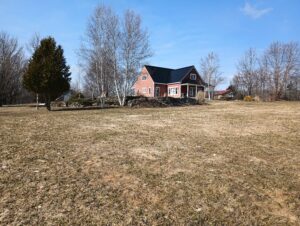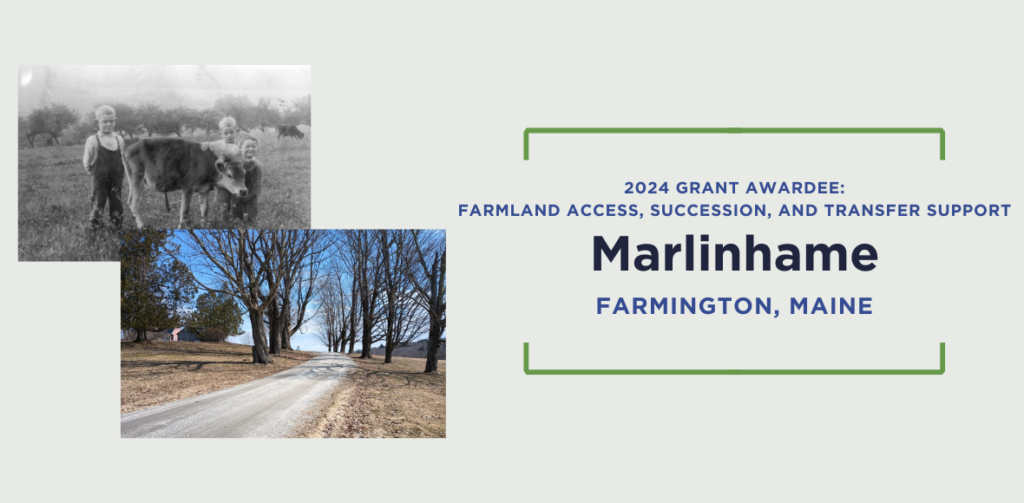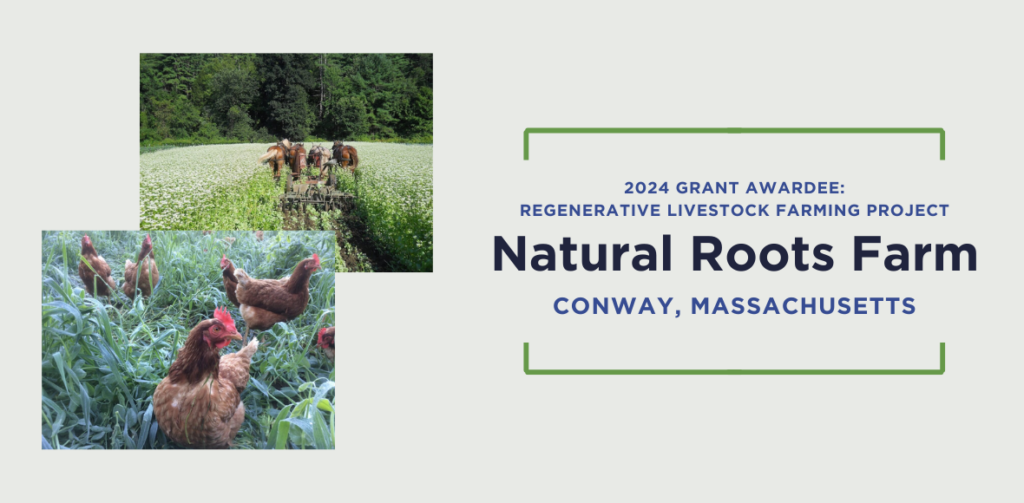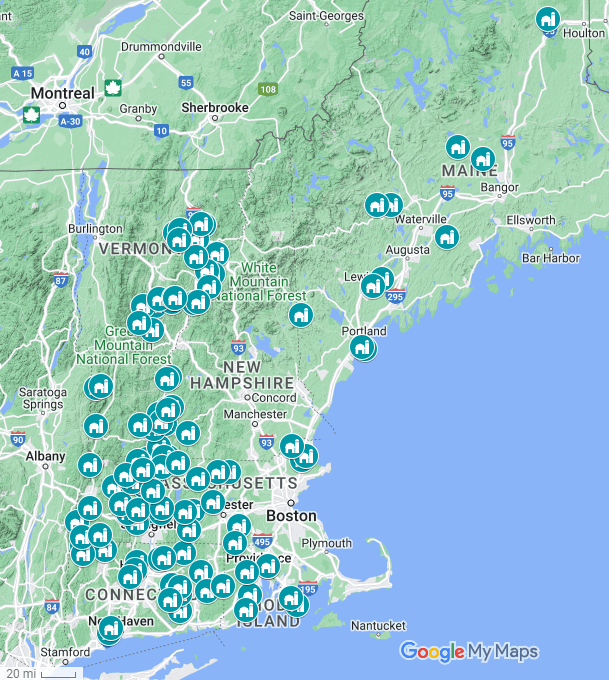American Farmland Trust’s New England Farmer Microgrants Program awards nearly $1M to 117 farmers across New England
American Farmland Trust’s New England Farmer Microgrants Program (NEFMP) awarded nearly $1M in grants to support New England farmers between February and March 2024. 117 farmers were awarded a collective $954,850 in funds to support a range of important projects. This is the largest cohort in the history of the New England Farmer Microgrants Program and the highest dollar amount awarded via NEFMP in any year. Now in its fifth year, NEFMP continues to address key barriers faced by farmers in the region including access to land, farm succession and land transfer planning, and adopting regenerative agriculture or soil health practices on livestock operations.
Created in 2020 to boost financial assistance to farmers in the region, the NEFMP has grown from an initial crop of 40 awardees in its first year to a total of 351 awardees and just over $2 million awarded since the program’s inception. “These awards have supported farmers through some difficult seasons. From helping with the purchase of equipment and inputs to make their farms more viable and resilient in the face of climate crises, to facilitating access to farmland and support for farm succession planning, this grant program has directly addressed critical support needs for a wide range of New England farmers,” said Jim Habana Hafner, AFT New England Regional Director.
The NEMFP provides funding under two grant programs: the Western New England Regenerative Livestock Farming Grant (RLF), and the Farmland Access, Succession, and Transfer Support Grant (FAST). This year, $855,000 was awarded to 95 farms through the RLF. To date, this grant has awarded over $1.6 million to livestock operations in 23 specific western New England counties, supporting projects that facilitate regenerative agriculture and improve soil health, water quality, and wildlife habitat. This was made possible by increased funding through a federal Regional Conservation Partnership Program (RCPP) grant awarded to AFT in 2020 called the Western New England Regenerative Agriculture Project. The RCPP, led by the Natural Resources Conservation Service (NRCS) and American Farmland Trust and involving many other partners, provides resources to livestock farmers to implement regenerative agriculture practices, combat climate change, and improve the resiliency of our agricultural systems and is one of the largest soil health projects in New England’s history.
New England has some of the most expensive farmland in the entire country; in 2023, the first, third, and fourth highest farmland values were in Rhode Island, Massachusetts, and Connecticut, respectively. The prohibitive costs of farmland and housing, along with many other factors, create barriers for farmers looking to start or expand their farm operations. Land access is particularly challenging for historically underserved producers, including new and beginning farmers, farmers of color, veteran farmers, and limited resource farmers.
In Rhode Island, where farm real estate values are the highest in the nation at $18,300 per acre, farmers like Pat McNiff of Pat’s Pastured in East Greenwich, RI, have struggled for years to find secure and affordable access to farmland.
“Our farm has been working very hard on finding land that will provide us with the security and stability that we need to keep farming the way that we know is best for the land, the animals, and the community who support us. Having a long-term lease or owning our farm is incredibly crucial to finding that stability. This grant will really help us on our pathway to attaining that stability,” Pat says.
Farmland and farmers are also threatened by the loss of land. A majority of New England’s senior farmers do not have a young (under 45) farm operator working with them. Many farm owners have not developed a plan for the future of their farms, leaving farmland and businesses vulnerable to going out of agriculture or getting sold for development. Planning for farmland’s future requires a significant investment of time, resources, and support from knowledgeable advisors. In response, the NEFMP’s Farmland Access, Succession, and Transfer Support Grants (FAST) provide direct financial assistance to farmers for projects that facilitate farmland access and acquisition, succession, or transfer, including farmland purchase or leasing transaction costs, consultant and attorney fees, surveys, appraisals, and agriculture conservation easement fees. This year, just over $99,850 was awarded to 22 farmers in Maine, Rhode Island, and the 9 eastern counties of Massachusetts through FAST grants.
According to one 2024 FAST awardee, Nancy Foss of Marlinhame Farm in Farmington, Maine,
“[Our] farmland property has been in our family for 100 years. Keeping it as productive farmland, when it would be highly profitable to sell it or to create a residential development instead, has been a key objective. The 9 current co-owners are actively creating a plan to permanently protect the property from development, but there are other succession planning issues we have less agreement on, and we are doing the sometimes-hard work to come to agreement…. These significant additional expenses, on top of our usual costs (increasing property taxes, insurance, and utilities) pose financial burdens and barriers to protecting the farmland.”


Through FAST Grants, farms like Marlinhame can get the support they need to plan for the future, protect critical farmland, and keep it in the hands of working farmers.

According to 2024 RLF awardees Maggie Toran and David Fisher of Natural Roots Farm in Conway, MA, “We are so grateful to have received a Western New England Regenerative Livestock Farming grant! Thank you! Over this past year, our appreciation for all those working in the realm of policy and financial support has grown tremendously. Because of the work of you and your team, we feel deeply supported and encouraged to keep doing what we do.” The team at Natural Roots Farm will use RLF funding to support regenerative practices like organic soil amendments that will help “maintain the highest soil stewardship practices on our farm. This, in turn, will help us to safeguard water quality in the South River, a tributary to the Deerfield River, which runs for about 3/4 of a mile through the middle of our farm. With support from AFT, we can easily enhance acres of our cropland to provide optimal habitat for a plethora of beneficial insects, while increasing biological diversity in the soil as well.”

Meet Some 2024 NEFMP Awardees
See the Map of All NEFMP Awardees

Hear From Past NEFMP Awardees
“It is not an over-exaggeration to state that the impact of the NEFMP funds on our farm business was absolutely crucial in our establishment of pasture raising livestock in a regenerative and climate smart way. While we wanted to implement more regenerative agriculture on our newly established farm through rotational grazing, we simply didn’t have the financial means to do so. The funding from the NEFMP made this dream possible for us. This funding and experience has truly helped shape the future vision of our farm business,” Steven Thompson, Thy Neighbors Farm, Torrington, Connecticut, 2023 Awardee
“NEFMP funds were absolutely critical to getting my farm business off the ground. As a new farm, accessing funding is challenging, but infrastructure needs are high in this initial phase. These funds allowed me to start at an appropriate scale and to lay important groundwork for the future of my farm.It’s hard to overstate just how impactful seed money is to a small, diversified farm. Winterfound is and will continue to be a more resilient farm ecosystem because of this aid.” – Matt Dami, Winterfound Forest Farm, Woodstock, Vermont, 2022 Awardee
“Our farm is located in a suburban setting, with limited farmland access. The land we wish to lease is in close proximity to us and is available to lease. The land is not classified as farmland, and developers wish to purchase it to build on. We would like to use it as farmland, and thus must negotiate with the town and create a lease agreement that is agreeable to all parties and helps secure our land tenure… [NEFMP funds will] cover attorneys’ fees to develop a lease agreement, cover the cost of the lease itself, and allow us to hire a consultant from the NRCS to help us make a plan for land use. This funding [will] help us secure more farmland to utilize for our CSA, in a very competitive and limited land market in our area. We would like to pursue a long-term lease or a lease to own agreement so that this land is not developed on and secured as farmland.” – Kaitlyn Kimball, Sunset Farm, Naugatuck, Connecticut, 2023 Awardee

